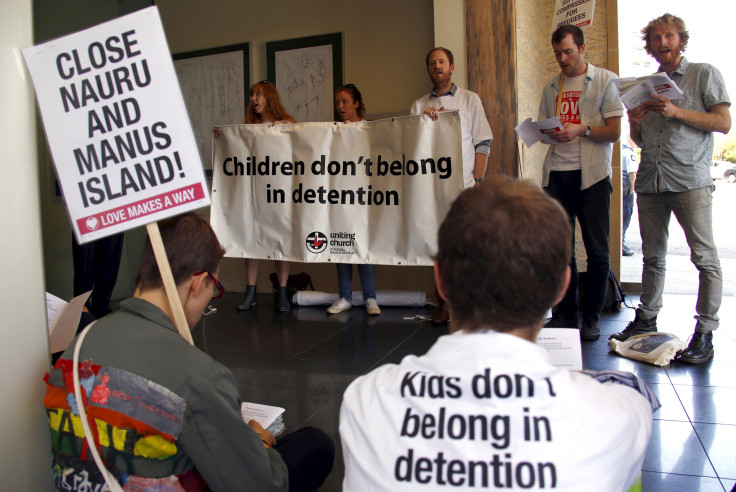Lack of media access into detention centres is shaping the asylum seeker conversation in Australia

Not a week goes by without the Australian media covering news related to asylum seekers, but as journalists continue to be banned by the government from accessing refugee detention centres, such as the one in Nauru, questions about how this affects reporting standards continue to grow louder.
According to the Australian trade union the Media, Entertainment and Arts Alliance (MEAA), the media ban to offshore processing centres is explained by the Department of Immigration and Border Protection as owing to “issues of privacy and the possibility of Sur place lawsuits”.
At the same time, the Australian Border Act makes it a crime for whistle-blowers in detention centres to reveal information about what occurs in these centres to journalists and the media. Anyone working at detention centres who leaks information can face up to two years in prison.
The repercussions of this policy, which many have argued is a suppression of the freedom of the press, has been thrown into the spotlight with the upcoming May release of a controversial new documentary film entitled “Chasing Asylum”.
The film features never-before-seen secret footage of offshore detention centres, and was created by Academy Award winning producer Eva Orner to expose the conditions refugees are subjected to while kept in these centres for months and even years.
It has been labelled the “film the government won’t want you to see”.
In an interview on Channel 10’s The Project, Orner argued that her new film does not break whistleblower laws, while noting she was sent a lot of the footage anonymously.
“I think the bigger question is what is going on here,” she said. “The fact that the government is so scared and paranoid that they’re legislating against it is what I think we should be focusing on.”
The Department of Immigration and Border Protection has refused to comment on the film.
Reporter Srinidhi Paranji from Paradesi Link tells International Business Times Australia that the film is an important one as it sheds light on an issue the public has the “right to know about”.
“The Australian government has put in a hard place over the last decade in terms of how they intend to deal with asylum seekers and refugees. Prior to 2007, the Australian public as a whole knew very little about what the government was doing and the literature on the subject was quite limited,” she said.
“Their treatment could have been better or worse than how it currently is but all we know is that the majority of refugees and asylum seekers are not treated according to the UN Charter of Human Rights.
“The government has always had a ban on classified areas and with whistleblowers and journalists showing the Australian public what is going on, what people previously accepted as beyond their control and influence, have fought to speak up for the speechless. There should be media access in detention centres because the Australian public has a right to know who is coming into our country and what is impacting upon and happening within the country.”
Amnesty International worker Nikki Chen agrees that if pursuing media freedom or striving to tell the truth leads to jail time, then there is a “dark age” ahead of Australia.
“The media should be used to monitor the government. Banning the media is banning Australia’s right to see what’s really going on. Whistleblowers are the ones that show the public what’s really happening, how human beings are treated by our government.”
While she agrees that the restriction of the media into detention centres is a sign that “the government doesn’t want us to see the inhumane conditions that are happening as we speak in Nauru and Manus Island,” student journalist Rowena Leung is also concerned about the effect the bans may have on a journalist’s role or responsible to report objectively.
After all, without the complete picture, Leung argues “our perception of the details surrounding offshore detention centres such as Nauru and Manus Island” becomes skewed.
The government’s policies could also erode the strength and importance of investigative journalism, even if it doesn’t mark the end of journalism, Paranji adds. She highlights the idea that journalists afraid of the consequences may be deterred from attempts to to seek out the truth, so that the truth will continue to remain undiscovered.
“Already we can see the reduction of investigative journalism among the new generation of journalists and the increase of revenue centric journalism with the close association of the capitalists and the media,” Paranji notes.
“The people have a right to know what is going on within Australia and what all these whistleblowers are doing is providing journalists and the people who have the influence to inform the public, information about the realities of offshore detention facilities.
“The severe consequence, which they face is unjustified in its prevention of the ideals of democracy, a pillar stone of the Australian Constitution and way of life, where the people have the right to access information and knowledge.”
Paranji has high hopes the film will shape the way we discuss and think about asylum seekers in Australia, noting that Australians are currently quite “removed” from the situation.
“There is a shroud of secrecy and a sense of the unknown around Manus and Nauru so I think this documentary will allow us to experience and try to understand what these people are going through and how we can help them.”
However, she is confident that with a growing politically motivated generation of Australians, the actions of the government will be much “harder to hide from the public”.





















